Zimbabwe Times
I WISH to bring to public attention certain incorrect information which was contained in a Zimonline.com story which was also carried on this website, giving an eye witness account of how a particular police officer based at Machipisa Police Station witnessed the brutal assault on MDC officials and supporters.
The story said Arthur Mutambara, the president of a faction of the Movement for Democratic Change, was assaulted, but not seriously. I spent Sunday and Monday night in the same cell with him; he was never assaulted, as alleged by the Machipisa police officer quoted in the story. In fact, after his arrest Mutambara was never taken to Machipisa where the assaults took place. He was taken directly to Harare Central Police Station and then to Avondale Police Station where I spent Sunday and Monday nights with him in the same cell.
There was not a single scratch on his face, his head or anywhere else on his body. There was absolutely nothing on him and that's a fact. He was actually asking us about how people had been beaten about. Our two other cellmates, both supporters of the Morgan Tsvangirai faction, Todiyi Todiyi and Chemhere asked Mutambara how come he had not been assaulted. He said he was lucky to be taken to Harare Central, where he was not subjected to any beating.
Mutambara and his colleagues were driving separately in Highfields where they were arrested, but they were taken to Central. The Tsvangirai group was taken to Machipisa and that is where the assaults took place. That is where I was taken. I witnessed the assaults. In fact, as far as I could see and remember, most of the leaders from the Mutambara faction, among them Job Sikhala, were never assaulted or hurt in any way.
The second point I would like to bring out is that contrary to the policeman's testimony, the MDC president, Morgan Tsvangirai and the rest of the leaders and supporters who were brought and assaulted at Machipisa Police Stations, were never at any point blindfolded before being taken out of the station.
My own ordeal started as I was driving in Highfields with my colleague, Tendai Musiyazviriyo, on that fateful day. The whole place was deserted, shops having been forcibly ordered to close by the police around 8 am in the morning. The police presence was heavy on the streets. After driving around for about 45 minutes we were eventually stopped near Cyril Jennings Hall. Six armed police officers, two of them women, told us to get out of the car. They asked us to identify ourselves and we immediately brought out our valid press cards. For the record, I am fully accredited with the Media and Information Commission as a freelance journalist and have been accredited since 2003.
Upon presentation of the cards we were pushed to the ground and told to lie down and then they suddenly started beating us. I remember trying to reach for my cell-phone which was lying on the tarmac. It was smashed to the ground by a woman police officer who then kicked me in the mouth. I started to bleed from the mouth and the nose. The beating suddenly stopped. I was told to surrender the car keys before we were handcuffed and thrown onto the back of a police truck. As we drove to Machipisa Police Station, heads down, we were accused of being sellouts and puppets of the west and also of working together with the political opposition.
When we arrived at the police station we were told to get out of the police vehicle and to join about 10 people who were lying on the ground in the station grounds. We just stood there in utter disbelief. We were shoved to the ground, handcuffed and the beating started again. I have never experienced so much pain in my life and I honestly thought I was going to die. After the beating, which was mainly concentrated on my back and buttocks, they removed the handcuffs. We were ordered to march into the charge office.
I did not march; I ran as fast as I could but was tripped by a police officer who apparently thought I was trying to run away. I fell to the ground, quickly got up and entered the charge office. I remember seeing a police officer bringing our smashed camera equipment and dropping it on the floor in the charge office. A woman officer began to take details of our particulars and equipment. I could not talk as I was in so much shock and pain. Tendai told them my name.
The MDC president, Tsvangirai, then arrived at the police station, accompanied by William Bango. They were ordered to join their supporters who were lying on the ground in the fenced area of the station.
Tsvangirai was the first to be attacked, being set upon even before he was ordered to lie down. Our details recorded, we were ordered to go out and join Tsvangirai and the others. I remember entering the fenced area and seeing Tsvangirai being struck several times with batons. He did not scream. I thought I was dreaming, as I could not imagine this was happening to such an important and respected man in Zimbabwe.
He just lay there and tried to raise his hands to defend his head from the blows. He kept on uttering the words, "Chii nhayi? Chii nhayi?" (What is it? What is it?). For the next hour or so were subjected to the most excruciating torture I have ever experienced in my life.
I felt sorry for Sekai Holland who was brutally assaulted several times and also for a one-legged MDC supporter on crutches who was repeatedly beaten. I remember him crying out for his sons, thinking he might never see them again.
Grace Kwinjeh was lashed with a whip. A belt with metal studs caught her on the ear. A part of the ear nearly came off. The women were very brave. They never screamed.
When the beating stopped we were told to get back onto the truck. The vehicle had been parked in the open exposed to the sun for hours. I remember very well from the temperature reading in my car that it was around 36 degrees on that day and to be told to lie down on the metal floor of an open truck that had been standing in the sun was like jumping into a frying pan.
A cool breeze of air came as a relief when the truck started to move. Our first stop was Harare Central Police Station where we were told to get off and again lie on the tarmac for about another hour. A senior police officer instructed that we should go to a water tap, two at a time, to wash the blood from our faces and elsewhere on our bodies. I don't know whether this was done out of sympathy or whether they wanted us to remove the bloody evidence of the beatings which we had experienced. I remember helping Tsvangirai to his feet; he could hardly stand up. But he collapsed. Someone brought a cup of water which he poured on his face and he regained consciousness.
Everyone who could walk was given a chance to wash themselves. Then they started taking down our names. Blood continued to ooze out of my nose and mouth. The washing did not stop the bleeding from Lovemore Madhukus head and the large cut on Tsvangirai's head. Blood flowed freely from an open wound below the knee of Tsvangirais bodyguard. The blood cloated eventually.
It was obvious most of the injured people needed to be rushed to hospital. This did not happen, however. Instead we were ordered an hour later to get back onto the police truck. Our next stop was Borrowdale Police Station where Tsvangirai and three other people were dropped off. From there we proceeded to Malborough Police Station where Lovemore Madhuku, Job Sikhala and other people including my colleague, Tendai were dropped off.
I was dropped off at Avondale Police Station with Sekai Holland, Todiyi Todiyi and Chemhere. Initially they dropped off William Bango. Then one of the policemen said Bango should jumpback onto the truck as they did not want him in the same cell with Mutambara. Mutambara arrived later and joined Todiyi, Chemhere and me in the same cell.
Unforunately Mai Holland, who is 64, fell from the truck when the police ordered her to get off. She could hardly walk. The truck proceeded, or so I later learnt, to Braeside Police Station and eventually to Mbare. As we were removing our shoes and belts before entering the police cells Mutambara came in smartly dressed in a black suit.
I had last seen Mutambara as we were driving in Highfields. He was arrested and taken to Harare Central without being beaten up. I spent two nights with him. He had a clean shaven head, in any case he told us he was lucky not to be beaten. We talked about politics, family and many other issues.
I found it very interesting that when more people were brought into our cell the following day and we asked them what was happening outside they all told us that the whole MDC leadership had been arrested and that there was absolute chaos around the country.
They all told us that Tsvangirai, Madhuku and Mutambara had been arrested. None of them identified Mutambara who was sitting right next to me until they were told who he was. We were treated fairly well at Avondale Police Station. Mutambara was accorded much respect by the police. They called him Professor. I don't know whether they were mocking him. But he had access to The Herald. They gave him a pen and paper "to communicate with his lawyers".
Amai Sekai Holland was very helpful. Her sister brought her some ointment and she shared it with me. It really helped ease the pain on my back and buttocks. As I write this story my lawyer Beatrice Mutetwa is involved in battle with the police as they are refusing to release my car and broken camera equipment. This was the worst experience of my career since I entered the world of photo-journalism at The Daily News in 1998.
Since I parted ways with Mutambara on Tuesday I have constantly wondered whether the preferential treatment he received from the police was, in any way, a strategy by the government to create further friction between the two opposition leaders or whether they were just protecting their man, as is often alleged.
(An award-winning photo-journalist, Tsvangirayi Mukwazhi is the Zimbabwe Times photographer in Harare.)
Now you can
scan emails quickly with a reading pane. Get the new
Yahoo! Mail.


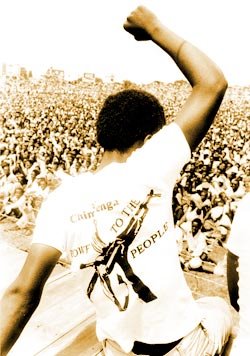
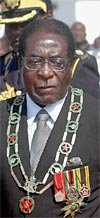
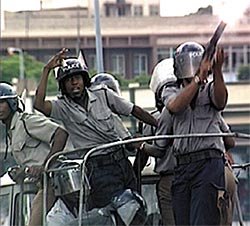



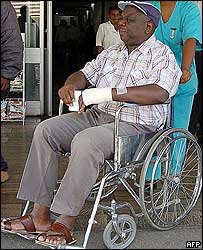
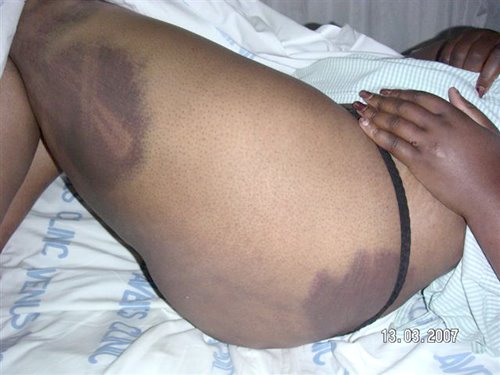
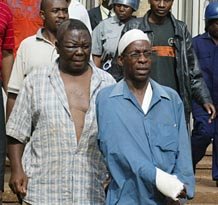
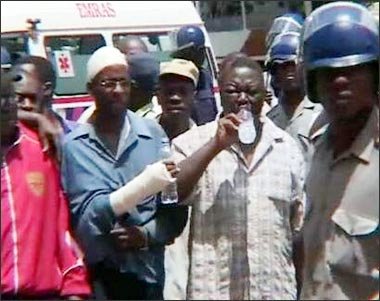
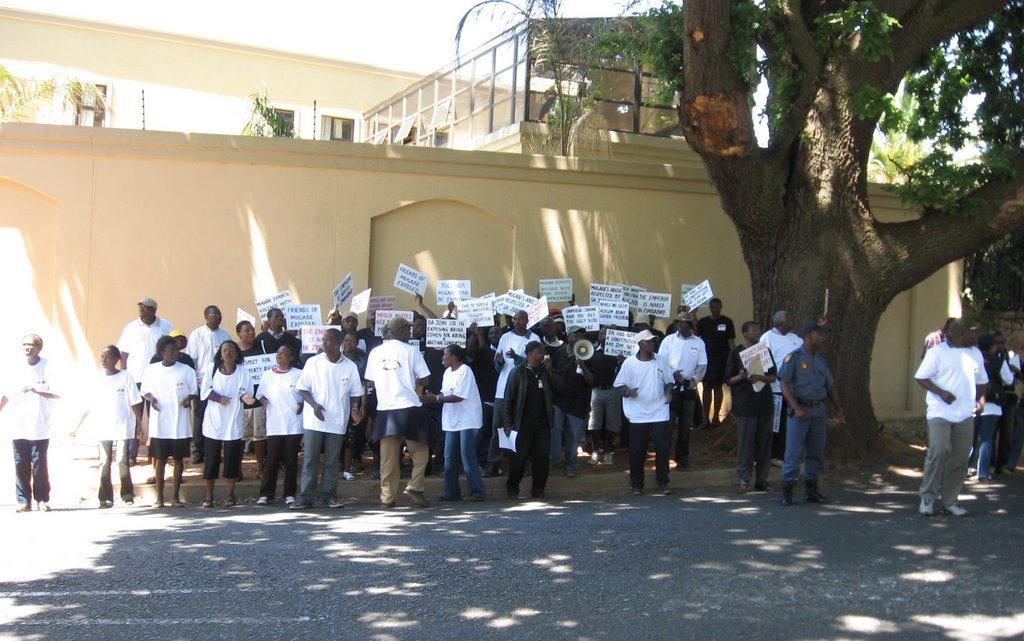
No comments:
Post a Comment